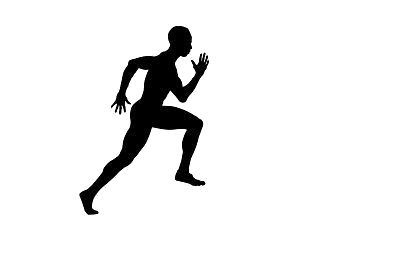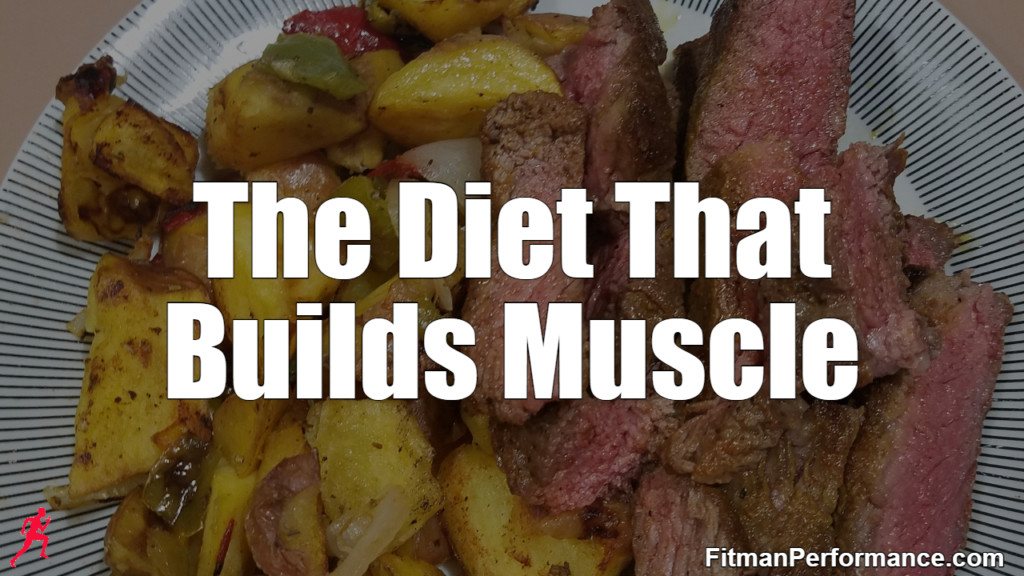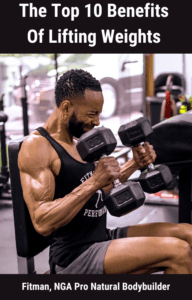Lifting weights builds muscle but without the right diet, you will be going nowhere fast in your quest to improve your body.
Last week we talked about the 3 keys needed to make great progress in the gym.
The implementation of those 3 principles will lead to phenomenal improvements with your physique and performance.
But training is only one-fourth of the battle. Even if you are training hard, you are leaving gains on the table if your nutrition is not dialed in for your goals.
One of the worst things to experience in the iron game is to train hard and not see real changes. You don’t want to leave meat on the progress bone.
Setting up and using a diet that builds muscle is not some complicated way of eating. It is actually pretty simple.
There are 3 important nutritional keys that will allow you to build a leaner body. They are:
1) Your Caloric Intake Must Match Your Goal
Thin?
A pure ectomorph?
Is your goal to gain muscle mass and strength?
Then why are you eating that low-calorie salad?
Why are you eating one full meal and a bunch of snacks all day? Why are you eating like a cot dang bird?
On the other side of the coin maybe you are overweight. Is your goal to drop body fat and lose excess weight?
Then why are you eating so much food?
Why are your portion sizes enough for two grown men? Why are you eating until you cannot move anymore and induce a major case of the Itis?
In both of these cases, the caloric intake does not match the goal. Your caloric intake must absolutely match what you are trying to accomplish in terms of gaining muscle or losing fat.
You will not build muscle or lose fat on the wrong diet.
I’ve seen this movie many times during my career in the iron game. And it always gets lousy reviews.
Finding out how many calories you need to eat is not as simple as using an online formula. I tell my clients that we have to “start where you are.”
If you are currently eating too little it would be a mistake to add a monstrous amount of calories to your diet overnight.
I cannot have someone who is currently eating 900 calories a day just jump up to 2000 calories a day.
This is a quick way to gain weight, but it will be mainly body fat and not the muscular weight you are looking for.
The better plan of action is to walk your calories up slowly to get you gaining muscle mass without a substantial fat gain.
Now if you are currently overeating, it would be a mistake to severely drop your calories too low.
This will work initially for weight loss, but you will soon become stagnant as your body will adapt to your caloric intake being too low.
Your progress will come to a halt, like a commuter in a traffic jam on the 405 (it’s horrendous).
Your body cannot see continual progress on a diet where you are literally eating nothing.
You have to bring your caloric intake down slowly so that you can still support your training and recovery.
Remember changing your physique is a process and great things require time to become great.
Using an app like MyFitnessPal will allow you to begin to track your food intake to find out how many calories you are currently consuming.
From there you can make the proper adjustments like the great Peyton Manning at the line of scrimmage.
You do not have to track your calories forever, but it does help you get into the habit of developing better nutrition practices.
While your overall caloric intake is very important, you cannot just have the majority of your calories be composed of pure junk.
A diet that builds muscle must be filled with the proper foods and correct ratios of those foods.

2) Your Macros Must Also Match Your Goals
Once you determine how many calories you need to be eating, it is time to break them down by the macronutrient.
Your macronutrients are your carbohydrates, your proteins, and your fats.
Your carbs and your fats are your bodies’ fuel sources, while protein is what allows you to build your foundation of muscle mass.
All foods will fall under a macro category. Your macro profile must be in line with what you are trying to accomplish.
You should start to look at your body as a gas tank.
When you overfill a gas tank, what happens? The excess spills over.
When your diet is too high in carbohydrates, fats, and overall calories, the spillover will result in unsightly body fat.
This may lead to increased sales for Spanx and products of that ilk, but I do not think you want to look soft like the Stay-Puft Marshmellow Man.
You see a calorie is not just a calorie. The quality of your calories definitely matters.
2500 calories of sugar and fat yield a radically different result than 2500 calories of high protein, moderate carbs/fat.
Most trainees will do well on a balanced macronutrient plan that features higher protein and moderate carbs/fats, but your macros can be adjusted to reach your goals.
You might be Bobby Bodybuilder in the final weeks of contest prep, whose carbs are lower than they normally would be as you chase a ripped body.
Or perhaps you might be Shemika Sprints, who had a tough morning training session of 3 x 300m at 90 percent speed, followed up by an afternoon session of upper body lifting.
You may need to live in Carb City that day just to recover from the work.
No matter where you are in your training, your macros must match your goals.
3) You Must Prioritize Your Pre And Post-Workout Nutrition
When it comes to a diet that builds muscle, mastering your pre and post-workout nutrition habits is the most important step.
But of these 3 nutrition keys that you can use to build a better physique, pre and post-workout nutrition is the most misunderstood concept.
Have you ever tried to use your cell phone throughout the day on a low battery? What always happens?
The phone always dies, and it never makes it through the day. The battery is not completely charged, and the phone runs out of juice.
Many trainees are just like that cell phone.
They show up to the gym with little to no food in their system. This drives me insane like the Joker.
By not consuming the proper foods before you train, you are setting yourself up for a horrendous training session.
The workout typically ends early, you get lightheaded, and you are forced to go home.
Or you slog through the session because you have zero fuel in the tank to use for the workout.
When this happens consistently, there should be no surprise as to why your body cannot and will not change.
I rank the pre and post-workout meals as the most important meals of your day on days that you train. The composition of these meals is very simple.
Before you train, eating a combination of carbohydrates and protein will do the trick.
The carbs will give you the energy to train hard throughout your workout.
Complex carbs (oats, brown rice, yams etc) will give you more sustained energy throughout the workout. They burn slower in your system.
Simple carbs (jasmine rice, russet potatoes etc) will work, but your energy may wane faster during the workout.
They burn faster in your system, so keep that in mind when you are choosing your pre-workout meal.
And the protein will allow you to avoid muscle breakdown during the training session.
After you train, a combination of simple carbohydrates and lean protein will do the trick.
The simple carbs will allow you to replenish your muscle glycogen (fuel) and the protein will allow you to begin the recovery process for your muscles.
Your fat content during these meals will be much lower than the carbs and the protein.
Fat slows digestion a bit, and your goal is to get the carbohydrates and the protein into your system as fast as possible.
I like to eat my classic Dog Food meal before I train. It is lean ground turkey, brown or jasmine rice, red beans, mixed peppers, and natural tomato sauce.
By skipping the pre and post-workout meals, you are shooting yourself in the foot with a shotgun when it comes to making progress.
You can completely avoid this scenario by being prepared.
If you prepare your meals in advance, you will have less of a chance of skipping these meals. Preparation is one of the major keys to success.
If you skimp on your diet, you will struggle mightily to build muscle and lose fat.
Conclusion
These 3 nutrition keys are vital to your success.
A diet that builds muscle and allows you to lose fat is critical to maximizing your physique and performance.
If you implement these 3 nutrition keys, your body will improve.
I’ll holla at you next time.
The People’s Trainer
Fitman



